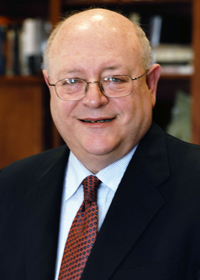State Audit Finds No Evidence of Waste, Fraud or Abuse at UC
In an official response to a Bureau of State Audits (BSA) report released today (July 28), University of California President Mark G. Yudof wrote: “We are proud of the fact that we have come through this review with validation of so many of our procedures and policies…. But, at what cost?”

Mark Yudof
Yudof urged the Legislative Audit Committee “to require those who seek to use the limited audit resources of the state to provide more evidence of malfeasance than innuendo and presupposition behind their requests.”
The 15-month audit was requested in February 2010 by California Senator Leland Yee. In a news release announcing his request, Yee said a comprehensive state audit would help “uncover the extent of the waste, fraud, and abuse within the UC, and finally hold university executives accountable.” The exhaustive audit found no evidence of waste, fraud or abuse.
Because of the complexity of the UC system – 10 major campuses, world-class research facilities, five medical centers and a division of agriculture and natural resources – the University opens its books routinely for a myriad of federal, state and local regulatory agencies, as many as 80 times a year, including more than 40 audits. Financial and programmatic data are made available and accessible, not only for these reviewers, but also for the public through regular web postings on the UC website.
This state audit examined five fiscal years of UC's financial, budgetary and other operational data. State auditors visited campuses and the systemwide headquarters and met and communicated with large numbers of UC staff over the 15-month period. The BSA findings validated University procedures in the distribution and use of resources, use of student tuition funds, subsidies for auxiliary enterprises, tracking of non-salary expenditures and the use of federal grant funds.
Moreover, the report noted that the University’s publicly available financial statements and schedules presented a significant amount of information based on detailed financial records. It deemed as reasonable the university’s classification of restricted funds in its corporate financial system and said the university did not inappropriately use state funds to guarantee debt for capital projects or use tuition revenues for debt payments.
Among other key findings, the BSA audit showed that UC has protected its core mission during the ongoing financial crisis; University expenses remain concentrated in instruction and research. Despite recent tuition increases to maintain academic quality, however, the audit confirmed that this new revenue only partially offsets the loss of state funding. The report affirmed that state cutbacks impede the University’s ability to maintain the quality of its educational programs.
Improving Understanding of UC Operations
The BSA report, which the agency titled, "Although the University Maintains Extensive Financial Records, It Should Provide Additional Information to Improve Public Understanding of Its Operations," made recommendations for improvements and changes in the area of campus funding allocations, in the general transparency of the UC budget process and University funds, and in the way the University uses student fees imposed by referenda.
In fact, prior to the audit, the University was developing a more transparent funding streams initiative that is now being implemented. The University also has launched a systemwide task force to examine the relationships among campus instruction, research and public service programs, student populations, campus costs and the distribution of funds to campuses.
University officials were shown a draft of the report before it became final. On that basis, UC President Yudof responded in a letter to State Auditor Elaine Howle, agreeing to make some changes suggested by the BSA, disagreeing with others and detailing suggested improvements that were already under way, such as replacing UC’s current budget and planning manual with a new set of budget guidelines.
He strongly objected, however, to auditors’ “unwarranted and inflammatory” attempt to portray unequal funding among UC campuses as evidence of racial or ethnic bias. The BSA reported that during fiscal year 2009-2010, the amount of UC funding per-student ranged from $12,309 at UC Santa Barbara, a campus with no health sciences programs and only a 10 percent graduate-student enrollment, to $55,186 at UCSF, a health sciences campus with no undergraduates.
“While the University’s budget process does not consider the racial or ethnic makeup of the campuses, we noted that the four campuses with a higher than average percentage of students from underrepresented ethnicities all received less funding than would be received under an even per student distribution,” the BSA report said.
“The University adamantly disagrees with the BSA’s analysis and comments inferring an inequitable distribution of funding across campuses,” Yudof wrote.
“There is absolutely no basis — statistically, historically, or ethically — for drawing such a connection. Furthermore, the BSA makes no investigation into or observation of disproportionate or inequitable treatment or outcomes for students at different campuses.”
The University also disputed the BSA’s contention that it inappropriately used revenue from student fees generated by a referendum on the Los Angeles campus, the so-called SPARC fee. A student-majority advisory board approved the use of the fees to fund two UCLA capital projects not specifically named in the referendum, a decision also approved by the UC Board of Regents and, contrary to the BSA’s assertion, not addressed by any legal ruling.
In closing, Yudof wrote, “While we disagree strongly with certain conclusions and commentary in the BSA’s report, we fully support what we believe was the intent of this audit – to continue to enhance the transparency of the University’s performance, with the end goal of improving the public’s understanding of our operations and facilitate accountability to our stakeholders.”
The full BSA report is available online [PDF].
For more information on UC financial information, please see the UC website.